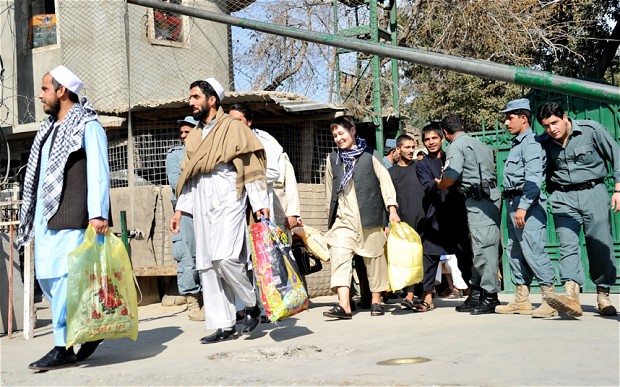Introduction
Hundreds of prisoners have been released from various prisons of the country in compliance with a presidential decree issued on 22nd Anniversary of Mujahideen Victory Day, falling on April 28th each year.
As per the decree five to ten thousand prisoners will be released from central and provincial jails from which around 500 prisoners from central and hundred others from provincial jails have been released.
Meanwhile, Amnesty International (AI) in their latest report about torture in confinement facilities around the world states that various types of torture and ill-treatment exits in Afghan prisons.
How is the condition of Afghan prisons? What are the challenges and problems facing implementation of justice? The Weekly Analysis Board of CSRS has analyzed this issue as following:
Afghan Prisoners Condition Inside and Outside the Country
International organizations usually report about worse conditions of Afghan prisons. AI has reviewed the conditions of jails in 141 countries, and stated that prisoners in Afghanistan are facing various types of torture.
Besides, national organizations also declared the conditions of prisons in Afghanistan as worse and along with other security observers stated about existence of tortures in the prisons.
Afghanistan’s Independent Commission for Overseeing the Implementation of Constitution (ICOIC) also considered the conditions of the prisons and said in some cases even the decree of the president has not been implemented.
After reports on worse situation of the prisoners were released, President Hamid Karzai appointed a delegation to investigate the cases of tortures and ill-treatment, assassination threats and sexual abuse in the prisons; but measures taken were not efficient. While the human right activists have always criticized government for their silence on prisoners’ condition, there haven’t been any measures to improve it and standardize prisons in the past decade.
However, some prisoners through their continuous strikes tried to draw attention of authorities to their problems but apparently the problems still exist.
On the other hand a number of Afghan jails have become immorality centers; reports on the sexual abuses and other immoral activities in prisons have been released several times. In 2011 for instance a report was released that the women prisoners of Ghazni prison are being sexually abused. According to women prisoners in this prison officials of the prison tried several times to sexually abuse them.
The foreign troops in last 13 years had several secret prisons in the capital and provinces, where the prisoners faced brutal tortures and ill-treatment. Recently the Afghan government followed this case and finally closed some of the secret prisons in southern Kandahar and Helmand provinces.
On the other hand the prisoners outside of the country are also in worse condition. Around 5000 Afghans are imprisoned in Iran; hundreds of them are being hanged without fair trials and basic rights to hiring lawyers for self-defense. Afghan government has reacted very weakly to Iran’s illegal prosecution of Afghan prisoners and did not even summon Iranian Ambassador as protest.
Afghan government must protect rights of the Afghan nationals not only in Iran but across the world and take serious measures against unfair collective hanging of Afghans in Iran.
Presidential Decree and Challenges to Bringing Justice
Problems and widespread corruption in Afghan government agencies especially in judiciary caused innocent people being imprisoned for months and years without any documents against them, while criminals are freed in return for money and other deals.
The killers and mafias who are connected with high level officials have never been prosecuted. Warlord Hakim Shujai despite killing hundreds of innocent people in southern Uruzgan province and an arrest warrant against him was invited as guest to Arg.
Corruption in judiciary has caused majority of the prisoners not benefiting from pardon decrees in some cases.
It is clear that among the prisoners who are being released in accordance with the presidential decree some real criminals are also released because of the widespread corruption, while these criminals should have been tried, but due to the weakness and widespread corruption in the government institutions they are not punished in months and years. The government should be held responsible for imprisoning suspects for months and years while the constitution has only allowed few hours to keep suspect before officially being convicted.
Judicial commutation is common around the world. The President has the right to pardon prisoners or lessen their punishment within a particular limit. People are not against it, but they want the rules and justice to be implemented; but the criminals who commit killing, hijacking and violations are not trialed in last years and after a shortly being confined they are released, but the innocent people have spent months and years in the prisons without any trial.
The fundamental problem is the connection of criminals to high level government officials, though the government is aware of this, but does not take steps toward implementation of justice. This has resulted increase in crimes in major cities and social disorder, worst security and political instability.
The government does not yet have a comprehensive strategy for imprisonment and detaining. Foreign troops by pursuing their own strategy and plan are building prisons across the country; they want to make the nation weak by detaining citizens under different labels. Afghanistan government not having resources to fund National Security Forces is keeping around twenty-thousand prisoners across the country not having proper documents and facilities to put them on trial. Given the serious problems in prisons all over the country, weakness and corruption in judiciary and lack of implementation of justice require serious review in judicial system.

